Filter by
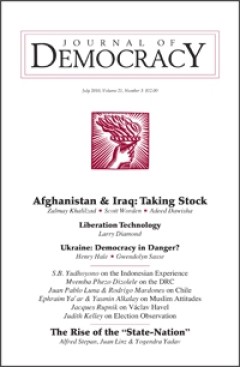
Constraining Government Power in Africa
African politics is often characterized as a realm of “informality,” but formal rules and institutions actually loom large, especially with regard to overweening executive power and the reforms that may help to rein it in.
- Edition
- Volume 22, Number 1, January 2011,pp. 96-106
- ISBN/ISSN
- 10455736
- Collation
- -
- Series Title
- -
- Call Number
- -

A Surge to the Center
The left-right ideological divide has begun to narrow in Latin America as citizens and leaders increasingly choose a pragmatic approach to politics and embrace the rules of the democratic game.
- Edition
- Volume 22, Number 1, January 2011.pp. 107-121
- ISBN/ISSN
- 10455736
- Collation
- -
- Series Title
- Journal of Democracy
- Call Number
- -

A Setback for Chávez
Hugo Chávez has been running a bounded competitive-authoritarian regime for some time, but its ability to compete is now slipping. Will this tend to make it less authoritarian—or even more so?
- Edition
- Volume 22, Number 1, January 2011.pp. 122-136
- ISBN/ISSN
- 10455736
- Collation
- -
- Series Title
- Journal of Democracy
- Call Number
- -

Colombia After Uribe
Often thought of as a “nascent” democracy, Colombia actually has longstanding democratic institutions. In 2010, they were effective in determining who would succeed a highly popular, two-term president.
- Edition
- Volume 22, Number 1, January 2011.pp. 137-151
- ISBN/ISSN
- 10455736
- Collation
- -
- Series Title
- Journal of Democracy
- Call Number
- -
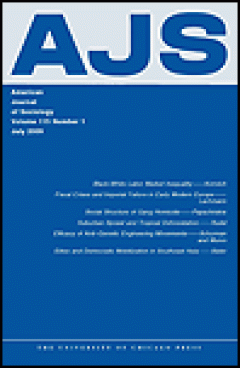
The Locus of Racial Disadvantage in the Labor Market
Using a pooled sample constructed from recent installments of the Displaced Workers Survey, this study examines the racial disparities in postdisplacement outcomes while controlling for the predisplacement experience and earnings of individual workers. It finds no racial difference in the reemployment wage, but there is a large racial disparity in the chances of reemployment among workers with …
- Edition
- Vol. 116, No. 3, November 2010. pp. 909-942
- ISBN/ISSN
- 00029602
- Collation
- -
- Series Title
- American Journal of Sociology
- Call Number
- -

A Model of Robust Positions in Social Networks
This article introduces a network model that pictures occupants of robust positions as recipients of diversified support from durably located others and portrays occupants of fragile positions as dependents on tenuously situated others. The model extends Herfindahl's index of concentration by bringing in the recursiveness of Bonacich's method. Using Newcomb's study of a college fraternity, we f…
- Edition
- Vol. 116, No. 3, November 2010. pp. 943-992
- ISBN/ISSN
- 00029602
- Collation
- -
- Series Title
- American Journal of Sociology
- Call Number
- -
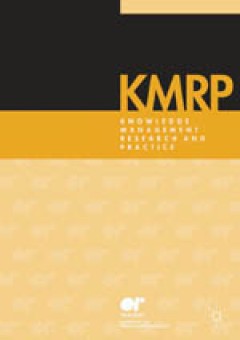
International academic knowledge creation and ba. A case study from Finland
Knowledge is created through discourse in ba that is the physical, mental and/or virtual arena of knowledge creation. This article studies ba in international humanist (H-group), technical (T-group) and scientific (S-group) research groups. These international groups consist of members originating from many countries. The empirical evidence is derived from interviews and discourse analysis of t…
- Edition
- Vol. 9, No. 1, March 2011.pp. 4–16
- ISBN/ISSN
- 14778238
- Collation
- -
- Series Title
- Knowledge Management Research & Practice
- Call Number
- -

A study of knowledge management enablers across countries
Knowledge has been long cited as a strategic asset and a source of competitive advantage for organizations. However, the creation of knowledge is a complex process that is influenced by several factors beyond the typical practice of knowledge management (KM). In this research, we assess the effects of leadership, Ba (shared context in motion), organizational culture, organizational control, and…
- Edition
- Vol. 9, No. 1, March 2011.pp.17–28
- ISBN/ISSN
- 14778238
- Collation
- -
- Series Title
- Knowledge Management Research & Practice
- Call Number
- -

Patterns of gaining and sharing of knowledge about customers : a study of an …
Knowledge sharing is an acknowledged pre-requisite for effective knowledge management. There is an extensive literature upon knowledge sharing practices and potential barriers. There is increasing recognition of the value of knowledge about customers within organisations. There are often several distinct avenues through which such knowledge is channelled. An assessment tool of knowledge flows i…
- Edition
- Vol. 9, No. 1, March 2011.pp. 29–47
- ISBN/ISSN
- 14778238
- Collation
- -
- Series Title
- Knowledge Management Research & Practice
- Call Number
- -

Impact of learning culture and information technology use on knowledge sharin…
Knowledge is regarded as a strategic resource in organizations; thus the leverage of knowledge is a key managerial issue. Knowledge creation, sharing and dissemination are the main activities in knowledge management. This study examines the influence that social and technological factors, such as learning culture and IT use, could have on knowledge sharing among students of the King Fahd Univer…
- Edition
- Vol. 9, No. 1, March 2011.pp.48–57
- ISBN/ISSN
- 14778238
- Collation
- -
- Series Title
- Knowledge Management Research & Practice
- Call Number
- -

An investigation into the factors affecting knowledge management adoption and…
Knowledge management (KM) is crucial for organizations to enhance competitive advantage. While the issues of KM have been widely discussed by numerous researchers, there is a paucity of studies pertaining to KM adoption and practice for the life insurance industry. Therefore, this paper aims to investigate the main factors affecting the life insurance business in adopting and applying KM. An ex…
- Edition
- Vol. 9, No. 1, March 2011.pp.58–72
- ISBN/ISSN
- 14778238
- Collation
- -
- Series Title
- Knowledge Management Research & Practice
- Call Number
- -

From group-based work to organisational learning : the role of communication …
This paper examines the role of group-based work as a knowledge sharing mechanism in fostering organisational learning. Relying on insights from communication research, the paper develops a set of propositions highlighting the role of communication forms in mediating the effect of group-based work on knowledge sharing. Our view on group-based work is grounded in the philosophical perspective on…
- Edition
- Vol. 9, No. 1, March 2011.pp.73–83
- ISBN/ISSN
- 14778238
- Collation
- -
- Series Title
- Knowledge Management Research & Practice
- Call Number
- -

Making knowledge management work : tactical to practical
Over the past 20 years, many researchers and theorists have generated a significant body of literature in the interrelated fields of knowledge management (KM), organizational learning (OL), and knowledge creation (KC). A large body of work generated by proponents of technology as a primary facilitator of KM, OL, and KC supports the expenditure of billions of dollars in information technology in…
- Edition
- Vol. 9, No. 1, March 2011.pp. 84–94
- ISBN/ISSN
- 14778238
- Collation
- -
- Series Title
- Knowledge Management Research & Practice
- Call Number
- -
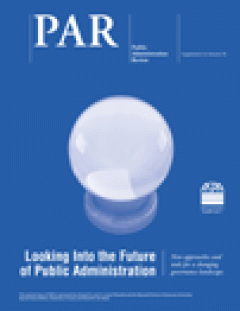
Practitioner's Perspective—Improving Sourcing Decisions
Federal departments and agencies increasingly rely on services to accomplish their missions. “Sourcing” refers to how government departments and agencies obtain the services they need to solve their mission delivery requirements and how those decisions are reached. Determining whether to obtain required services using federal employees or contracts with the private sector is an important legal,…
- Edition
- Vol 70, Issue Suppl s1, Dec 2010, pages s193–s200
- ISBN/ISSN
- 00333352
- Collation
- -
- Series Title
- Public Administration Review
- Call Number
- -

Strategic Management and Public Service Performance : The Way Ahead
Strategic management is now prominent on the agenda of public administration scholars and practitioners. In this review, the authors outline why approaches based on strategy are suited to public agencies, noting the ways in which strategy varies across public organizations, seeks to match internal capacities to organizational environments, and shapes the impact of external and internal constrai…
- Edition
- Vol 70, Issue Suppl s1, Dec 2010, pages s185–s192
- ISBN/ISSN
- 00333352
- Collation
- -
- Series Title
- Public Administration Review
- Call Number
- -
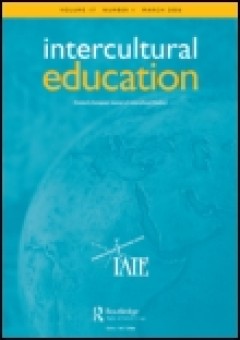
Indigenous studies and intercultural education : the impact of a place-based …
The article presents a student-impact assessment of a model two-year place-based intercultural approach to indigenous education. Students at Lewis & Clark Primary School in Missoula, Montana, connected face-to-face with tribal educators and members residing in the nearby American Indian reservation. The program's learning outcomes included impressive gains in knowledge of Montana tribes, fewer …
- Edition
- Volume 21, Issue 6, Dec 2010, Pages 597 - 606
- ISBN/ISSN
- 14675986
- Collation
- -
- Series Title
- Intercultural Education
- Call Number
- -

Multicultural awareness through English : a potential contribution of TESOL i…
The cultural diversity now evident in Greek society creates educational challenges and opportunities. Space to address these is provided by the multicultural awareness aspects of the discourse of the Cross-Thematic Curriculum Framework (CTCF). For English language classes, multicultural direction is provided through the disciplinary discussion of new teaching paradigm possibilities. In particul…
- Edition
- Volume 21, Issue 6, Dec 2010, Pages 581 - 595
- ISBN/ISSN
- 14675986
- Collation
- -
- Series Title
- Intercultural Education
- Call Number
- -

Whose knowledge is valued : a critical study of knowledge in elementary schoo…
This study critically examines knowledge in elementary school textbooks in China. Language analysis and story-line analysis are used to examine how the knowledge related to minority groups and how the knowledge related to the Han group are introduced and interpreted. This study finds that the Han knowledge dominates elementary school textbooks in China and that minority knowledge and culture ar…
- Edition
- Volume 21, Issue 6, Dec 2010, Pages 567 - 580
- ISBN/ISSN
- 14675986
- Collation
- -
- Series Title
- Intercultural Education
- Call Number
- -

Virtual journey coupled with face-to-face exchange : enhancing the cultural s…
This study attempted to enhance cultural sensitivity for graduate students at an American and a South African university, using a six-week online List Serv, email buddy exchange, and two-week face-to-face experience. After the course was over, results of the intercultural developmental inventory, using t-tests for related samples, showed that there was a significant difference (alpha equals .04…
- Edition
- Volume 21, Issue 6, Dec 2010, Pages 549 - 566
- ISBN/ISSN
- 14675986
- Collation
- -
- Series Title
- Intercultural Education
- Call Number
- -

Eux autres versus nous autres : adolescent students' views on the integration…
Focus group interviews with secondary school students in Quebec reveal assimilationist discourses concerning the integration of newcomers. The first part of the study involved interviews with immigrant students. In the second part of the study, reported here, host society youth describe fears of losing their cultural identity. Interview data indicate influences of exclusionist discourses from t…
- Edition
- Volume 21, Issue 6, Dec 2010, Pages 535 - 547
- ISBN/ISSN
- 14675986
- Collation
- -
- Series Title
- Intercultural Education
- Call Number
- -
 Computer Science, Information & General Works
Computer Science, Information & General Works  Philosophy & Psychology
Philosophy & Psychology  Religion
Religion  Social Sciences
Social Sciences  Language
Language  Pure Science
Pure Science  Applied Sciences
Applied Sciences  Art & Recreation
Art & Recreation  Literature
Literature  History & Geography
History & Geography